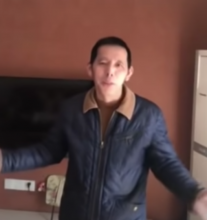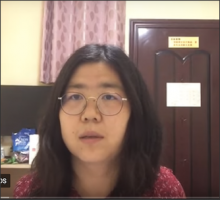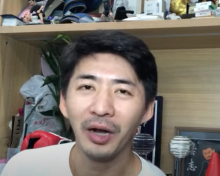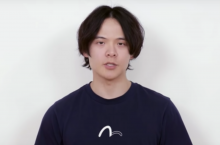Whatever happened to China’s COVID citizen journalists?
On April 30 this year, a middle-aged businessman from Wuhan is expected to be released from prison.
Fang Bin’s crime?
He posted videos of what was happening in Wuhan in the early weeks of COVID-19 in 2020.
As the deadly disease emerged in the central China city, Beijing was not only battling the virus but it was also trying to stamp out any independent sources of news on the pandemic.
Quickly, people began disappearing: doctors, citizen journalists and activists all went silent.
A little more than three years on, we take a look at what happened to these other casualties of China’s COVID pandemic: two in prison, one in the US and the other free, but frightened into silence.
Fang Bin (方斌)

Fang Bin, a local clothing salesman, had filmed from Wuhan No. 5 Hospital and a funeral home in the city where dead bodies were piling up. This was early 2020 when no one knew what this mysterious and deadly respiratory illness was.
After a few videos documenting his police harassment, his feed went silent .
Now, more than three years later reports have emerged that Fang was sentenced at a secret trial at a court in Jiang’an District in Wuhan, to more than three years in prison. No official paperwork has been released to the family and there is no information on the charges.
Another report said he was accused of “picking quarrels and provoking trouble”, a common catch-all crime used to punish human rights defenders, in March 2021. The same report said that Fang was a Falun Gong practitioner and had suffered years of harassment, including time in a re-education through labour camp, for his beliefs.
Because his imprisonment has been kept secret, it is likely he has had no visitors for the entire time. One source said that he may have been kept in solitary confinement too. His family have been told he will be released on 30 April 2023.
China is notorious for continuing to confine prisoners who have served their sentence in a practice known as Non-Release Release (NRR). We urge the international community to keep a close eye on his case to ensure that he is now genuinely freed.
Read our report on NRR here.
There have been unconfirmed reports of a leak that the Chinese Communist Party’s Political & Legal Affairs Committee (a powerful body that oversees domestic security among others) intervened in Fang’s case. While these leaked documents have not been verified it is well known that this committee is involved in handling political cases like Fang’s.
Zhang Zhan (张展)

Citizen journalist, activist and former lawyer Zhang Zhan was also livestreaming on Twitter and Youtube, criticizing the government response and showing the impact of the virus on people in the city.
She disappeared 14 May. In December 2020, she was sentenced to four years for picking quarrels and provoking trouble, the first person to be publicly sentenced for independently reporting on the pandemic.
There are concerns about Zhang’s physical and mental health. After staging a hunger strike to protest her imprisonment, her weight reportedly dropped below 40 kg.
Zhang is not due to be released until May 2024, although there have been calls for her early parole on health grounds.
Chen Qiushi (陈秋实)

Chen Qiushi, a former rights lawyer turned citizen video journalist, made posts in late January 2020 that quickly went viral about what was happening in Wuhan. He disappeared on 7 February.
Friends said he had been detained and then later released.
Qiu then emerged for the first time in September 2021 on his friend’s YouTube channel looking well but saying that he couldn’t talk about what had happened to him.
Chen had previously gained many followers by covering the anti-extradition bill movement in Hong Kong in 2019.
Li Zehua (李泽华)

Former journalist for state TV station CCTV Li Zehua (also called Kcriss Li) who had turned citizen journalist raced to Wuhan in the early days of the pandemic to interview local residents and even reported from one of the virus research laboratories in the city.
On 26 February he livestreamed as police officers hammered on his apartment door.
Then his channel went quiet.
He emerged two months later in April 2020 in a bizarre video confession that was staged. He thanked the police for looking after him and said he had been sent into quarantine. In August 2021, Li left China for the US and recently gave an interview to the Committee to Protect Journalists (CPJ) in which he confirmed that he had been forced to make that April video.
“Authorities wanted me to praise them, but I reduced that to the minimum,” he told CPJ. “After I was released, one of the provincial police chiefs reached out to me and asked me to post something because a lot of people were concerned about where I was. I refused. I couldn’t do it.”